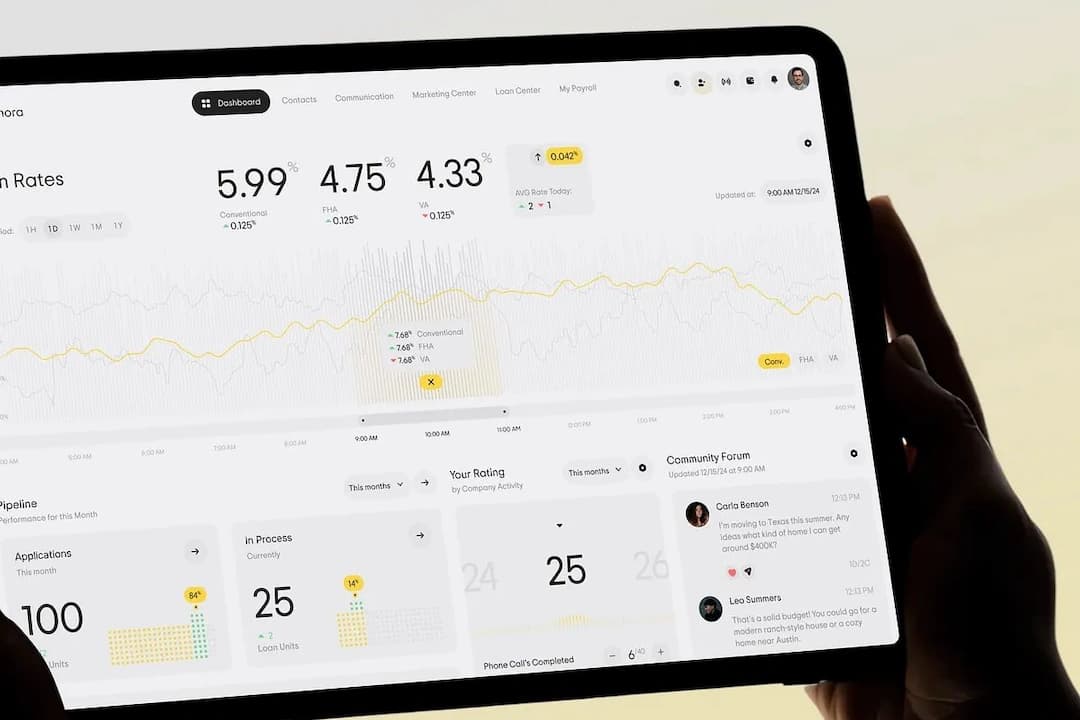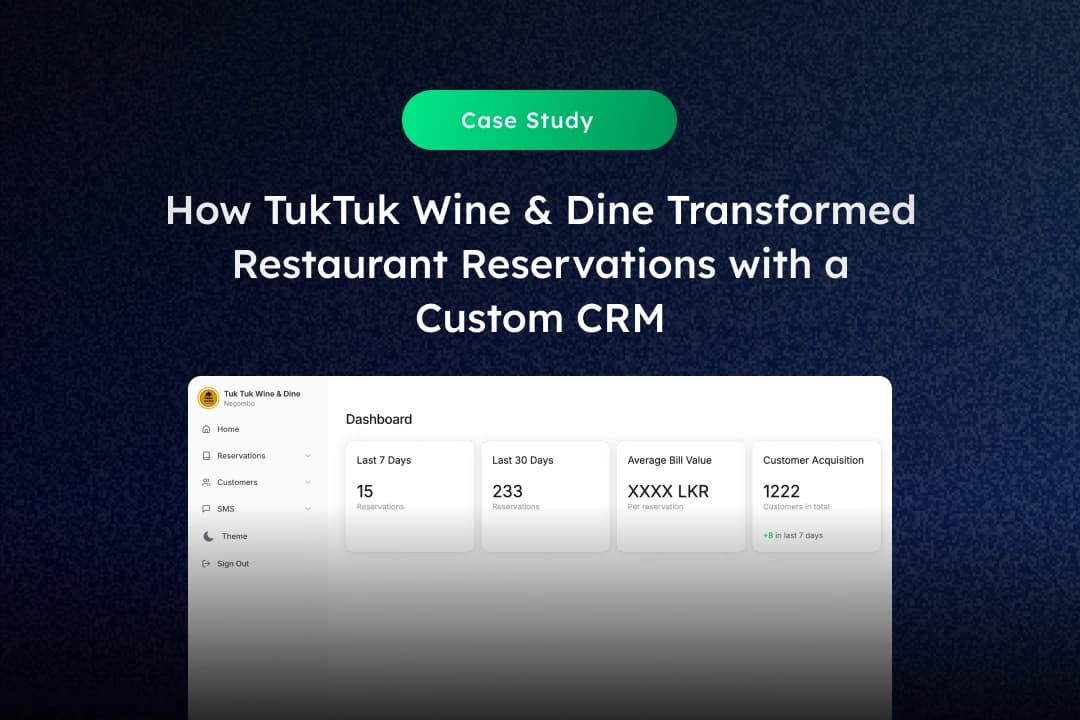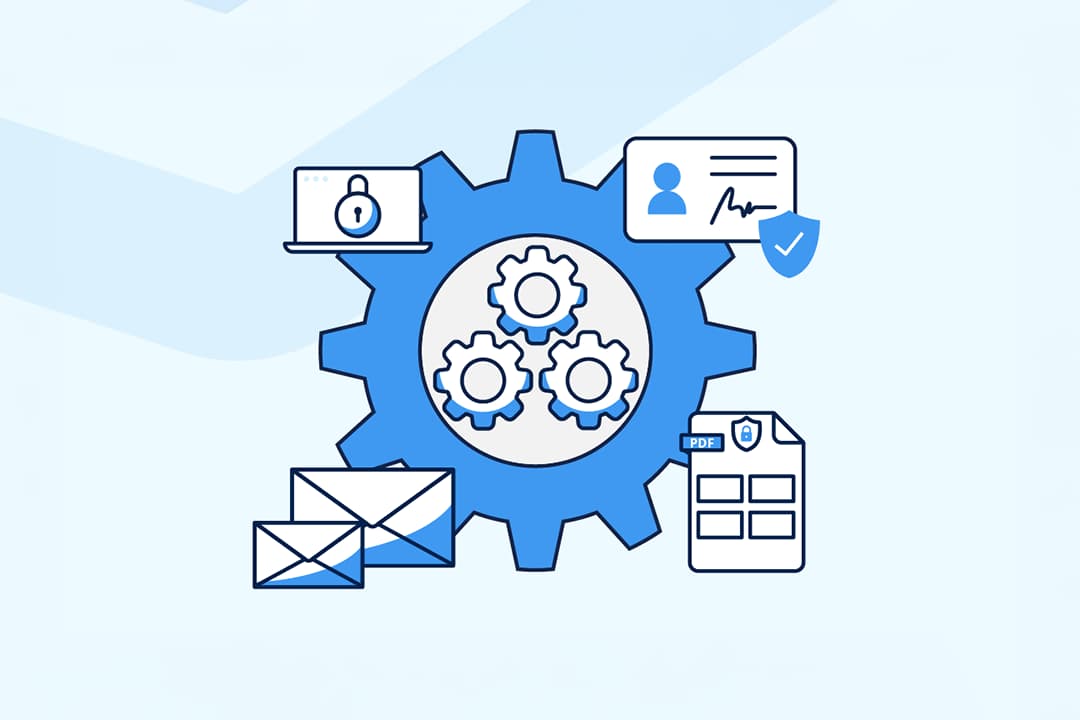
Introduction
Customer Relationship Management (CRM) systems have become essential tools for businesses looking to build stronger relationships with their customers, improve sales performance, and drive sustainable growth. In today's competitive Sri Lankan market, where customer expectations are higher than ever, implementing an effective CRM system can be the difference between success and failure. This comprehensive guide explores CRM systems, their benefits, implementation strategies, and best practices specifically tailored for Sri Lankan businesses.
What is a CRM System?
Definition and Core Purpose
A Customer Relationship Management (CRM) system is a technology platform that helps businesses manage and analyze customer interactions and data throughout the customer lifecycle. The primary goal is to improve business relationships, streamline processes, and increase profitability.
Key Components
- Contact Management: Centralized customer database
- Sales Pipeline Management: Track sales opportunities and deals
- Marketing Automation: Automated marketing campaigns and lead nurturing
- Customer Service: Support ticket management and customer communication
- Analytics and Reporting: Business intelligence and performance metrics
- Integration Capabilities: Connect with other business systems
Types of CRM Systems
1. Operational CRM
Sales Force Automation (SFA):
- Lead management and qualification
- Opportunity tracking and forecasting
- Sales pipeline visualization
- Quote and proposal generation
- Sales performance analytics
Marketing Automation:
- Campaign management
- Lead scoring and nurturing
- Email marketing integration
- Social media management
- ROI tracking and analytics
Customer Service:
- Support ticket management
- Knowledge base management
- Live chat integration
- Customer feedback collection
- Service level agreement tracking
2. Analytical CRM
Customer Analytics:
- Customer segmentation
- Lifetime value analysis
- Churn prediction
- Purchase behavior analysis
- Customer satisfaction metrics
Business Intelligence:
- Sales performance reporting
- Marketing campaign effectiveness
- Customer service metrics
- Revenue forecasting
- Trend analysis
3. Collaborative CRM
Communication Management:
- Multi-channel communication
- Team collaboration tools
- Document sharing
- Meeting scheduling
- Knowledge sharing
Partner Management:
- Vendor relationship management
- Channel partner tracking
- Joint marketing campaigns
- Performance monitoring
- Contract management
Benefits of CRM Systems for Sri Lankan Businesses
1. Improved Customer Relationships
Centralized Customer Data:
- Complete customer history in one place
- 360-degree customer view
- Personalized interactions
- Consistent communication
- Better customer understanding
Enhanced Customer Service:
- Faster response times
- Proactive customer support
- Issue resolution tracking
- Customer satisfaction improvement
- Loyalty program management
2. Increased Sales Performance
Sales Process Optimization:
- Streamlined sales workflows
- Better lead qualification
- Improved conversion rates
- Sales forecasting accuracy
- Performance tracking and coaching
Revenue Growth:
- Cross-selling and upselling opportunities
- Customer retention improvement
- New customer acquisition
- Average deal size increase
- Sales cycle reduction
3. Marketing Effectiveness
Targeted Marketing:
- Customer segmentation
- Personalized campaigns
- Lead nurturing automation
- Marketing ROI improvement
- Campaign performance tracking
Lead Management:
- Lead capture and qualification
- Lead scoring and prioritization
- Marketing attribution
- Conversion rate optimization
- Sales and marketing alignment
4. Operational Efficiency
Process Automation:
- Automated workflows
- Reduced manual tasks
- Error reduction
- Time savings
- Cost reduction
Data Management:
- Data accuracy improvement
- Duplicate prevention
- Data security and compliance
- Backup and recovery
- Data integration
Popular CRM Platforms
1. Salesforce
Features:
- Comprehensive CRM functionality
- Extensive customization options
- Strong integration ecosystem
- Advanced analytics and reporting
- Mobile accessibility
Advantages:
- Market leader with proven track record
- Extensive third-party integrations
- Strong community and support
- Scalable for businesses of all sizes
- Advanced AI and automation features
Considerations:
- Higher cost for advanced features
- Complex setup and customization
- Requires training and expertise
- Ongoing maintenance requirements
Pricing: $25-$300+ per user per month
2. HubSpot
Features:
- Free CRM with paid add-ons
- Marketing automation
- Sales pipeline management
- Customer service tools
- Content management system
Advantages:
- Free tier available
- User-friendly interface
- Strong marketing tools
- Good integration options
- Excellent customer support
Considerations:
- Limited customization in free version
- Can become expensive with add-ons
- Less suitable for complex sales processes
- Limited advanced reporting
Pricing: Free-$1,200+ per month
3. Microsoft Dynamics 365
Features:
- Full business suite integration
- Advanced analytics
- AI-powered insights
- Mobile and cloud access
- Industry-specific solutions
Advantages:
- Strong Microsoft ecosystem integration
- Enterprise-grade security
- Comprehensive business suite
- Good for large organizations
- Strong reporting capabilities
Considerations:
- Complex implementation
- Higher cost
- Requires Microsoft expertise
- Overkill for small businesses
Pricing: $40-$200+ per user per month
4. Pipedrive
Features:
- Visual sales pipeline
- Activity tracking
- Email integration
- Mobile app
- Reporting and analytics
Advantages:
- Simple and intuitive interface
- Affordable pricing
- Good for small to medium businesses
- Strong sales focus
- Easy setup and use
Considerations:
- Limited marketing features
- Basic reporting capabilities
- Less customization options
- Limited integration options
Pricing: $12.50-$99 per user per month
5. Zoho CRM
Features:
- Comprehensive CRM suite
- AI-powered insights
- Multi-channel communication
- Customization options
- Integration with Zoho ecosystem
Advantages:
- Affordable pricing
- Good feature set
- Strong customization
- Mobile accessibility
- Good for growing businesses
Considerations:
- Interface can be complex
- Limited advanced features
- Support quality varies
- Integration limitations
Pricing: $12-$52 per user per month
CRM Implementation Strategy
Phase 1: Planning and Preparation (Weeks 1-4)
Business Requirements Analysis:
- Current process documentation
- Pain point identification
- Feature requirements
- Integration needs
- User requirements
Vendor Selection:
- Feature comparison
- Cost analysis
- Vendor evaluation
- Reference checks
- Pilot testing
Project Planning:
- Implementation timeline
- Resource allocation
- Budget planning
- Risk assessment
- Success metrics definition
Phase 2: Data Preparation (Weeks 5-8)
Data Audit:
- Current data assessment
- Data quality analysis
- Duplicate identification
- Data cleansing
- Data mapping
Data Migration Planning:
- Data extraction
- Data transformation
- Data validation
- Migration testing
- Rollback planning
System Configuration:
- User roles and permissions
- Custom fields and objects
- Workflow automation
- Integration setup
- Security configuration
Phase 3: Implementation and Testing (Weeks 9-16)
System Setup:
- CRM platform configuration
- Customization implementation
- Integration development
- User interface setup
- Security implementation
Testing:
- Functional testing
- User acceptance testing
- Performance testing
- Security testing
- Integration testing
Training:
- User training programs
- Administrator training
- Documentation creation
- Support procedures
- Change management
Phase 4: Go-Live and Optimization (Weeks 17-24)
Go-Live:
- Phased rollout
- Data migration
- User support
- Issue resolution
- Performance monitoring
Post-Implementation:
- User feedback collection
- Performance optimization
- Process refinement
- Additional training
- Continuous improvement
Essential CRM Features for Sri Lankan Businesses
1. Multi-language Support
Language Requirements:
- English (primary)
- Sinhala language support
- Tamil language support
- Localized user interface
- Multi-language customer communication
Implementation:
- Language switching capability
- Localized field labels
- Cultural adaptation
- Regional preferences
- Local date and time formats
2. Local Integration Capabilities
Payment Gateway Integration:
- Local payment methods
- Mobile wallet integration
- Banking system integration
- Currency support (LKR)
- Transaction tracking
Communication Integration:
- Local SMS providers
- WhatsApp Business integration
- Email service providers
- Social media platforms
- Voice calling systems
3. Compliance and Security
Data Protection:
- PDPA compliance
- Data encryption
- Access controls
- Audit trails
- Backup and recovery
Security Features:
- Multi-factor authentication
- Role-based access control
- IP restrictions
- Session management
- Regular security updates
4. Mobile Accessibility
Mobile Features:
- Responsive design
- Mobile app availability
- Offline capabilities
- Push notifications
- Touch-optimized interface
Sri Lankan Context:
- Low-bandwidth optimization
- Data usage considerations
- Battery efficiency
- Network-aware features
- Local app store availability
CRM Best Practices
1. Data Management
Data Quality:
- Regular data cleansing
- Duplicate prevention
- Data validation rules
- Standardized data entry
- Regular data audits
Data Security:
- Access control implementation
- Regular security reviews
- Data backup procedures
- Compliance monitoring
- User training on data handling
2. User Adoption
Change Management:
- Clear communication of benefits
- Comprehensive training programs
- User feedback collection
- Gradual rollout approach
- Ongoing support and assistance
User Experience:
- Intuitive interface design
- Customizable dashboards
- Mobile accessibility
- Performance optimization
- Regular updates and improvements
3. Process Optimization
Workflow Automation:
- Automated lead assignment
- Follow-up reminders
- Email sequences
- Task automation
- Approval processes
Performance Monitoring:
- Key performance indicators
- Regular reporting
- Trend analysis
- Benchmarking
- Continuous improvement
Measuring CRM Success
1. Key Performance Indicators (KPIs)
Sales Metrics:
- Lead conversion rate
- Sales cycle length
- Average deal size
- Revenue per customer
- Sales team productivity
Customer Metrics:
- Customer satisfaction score
- Customer retention rate
- Customer lifetime value
- Support ticket resolution time
- Customer engagement levels
Marketing Metrics:
- Lead generation cost
- Marketing qualified leads
- Campaign ROI
- Email open and click rates
- Social media engagement
2. ROI Calculation
Cost Savings:
- Reduced manual processes
- Improved efficiency
- Better resource utilization
- Reduced errors
- Time savings
Revenue Impact:
- Increased sales
- Better customer retention
- Improved cross-selling
- Faster deal closure
- Higher customer lifetime value
Typical ROI:
- Small businesses: 200-300% ROI
- Medium businesses: 300-500% ROI
- Large enterprises: 500-800% ROI
Common Challenges and Solutions
1. Implementation Challenges
User Resistance:
- Solution: Comprehensive change management
- Solution: Clear communication of benefits
- Solution: Gradual implementation approach
- Solution: Ongoing training and support
Data Quality Issues:
- Solution: Data cleansing and validation
- Solution: Data entry standards
- Solution: Regular data audits
- Solution: Automated data validation
2. Technical Challenges
Integration Complexity:
- Solution: Phased integration approach
- Solution: API-based integrations
- Solution: Expert technical support
- Solution: Thorough testing
Performance Issues:
- Solution: System optimization
- Solution: Regular maintenance
- Solution: Performance monitoring
- Solution: Scalability planning
3. Sri Lankan-Specific Challenges
Internet Connectivity:
- Solution: Offline capabilities
- Solution: Local data centers
- Solution: Mobile optimization
- Solution: Bandwidth optimization
Cultural Adaptation:
- Solution: Local language support
- Solution: Cultural customization
- Solution: Local training programs
- Solution: Regional preferences
Future Trends in CRM
1. Artificial Intelligence Integration
AI-Powered Features:
- Predictive analytics
- Automated lead scoring
- Chatbot customer service
- Personalized recommendations
- Sentiment analysis
Benefits:
- Improved decision making
- Automated routine tasks
- Better customer insights
- Enhanced personalization
- Increased efficiency
2. Advanced Analytics
Business Intelligence:
- Real-time dashboards
- Predictive modeling
- Customer journey mapping
- Advanced reporting
- Data visualization
Insights:
- Customer behavior patterns
- Sales forecasting
- Market trends
- Performance optimization
- Strategic planning
3. Omnichannel Integration
Multi-Channel Management:
- Unified customer experience
- Cross-channel communication
- Consistent messaging
- Integrated workflows
- Centralized data
Channels:
- Email marketing
- Social media
- Live chat
- Phone support
- Mobile apps
Cost Considerations
1. Implementation Costs
Initial Investment:
- Software licensing: $1,000 - $50,000+
- Implementation services: $5,000 - $100,000+
- Data migration: $2,000 - $20,000+
- Training: $1,000 - $10,000+
- Customization: $3,000 - $30,000+
Ongoing Costs:
- Monthly/annual subscriptions
- Maintenance and support
- Additional user licenses
- Integration costs
- Training and development
2. ROI Timeline
Typical Payback Period:
- Small businesses: 6-12 months
- Medium businesses: 12-18 months
- Large enterprises: 18-24 months
Long-term Benefits:
- Increased revenue
- Cost savings
- Improved efficiency
- Better customer relationships
- Competitive advantage
Getting Started: Next Steps
1. Immediate Actions
- Needs Assessment: Evaluate current customer management processes
- Vendor Research: Compare CRM platforms and features
- Budget Planning: Determine investment capacity and ROI expectations
- Team Preparation: Identify key stakeholders and users
- Timeline Development: Create implementation roadmap
2. Short-term Goals (1-3 months)
- Vendor Selection: Choose CRM platform and implementation partner
- Data Preparation: Clean and organize existing customer data
- System Configuration: Set up CRM system and integrations
- User Training: Train team members on new system
- Pilot Testing: Test system with limited users and processes
3. Long-term Vision (6-12 months)
- Full Implementation: Complete CRM rollout across organization
- Process Optimization: Refine workflows and automation
- Advanced Features: Implement AI and analytics capabilities
- Integration Expansion: Connect with additional business systems
- Continuous Improvement: Regular optimization and enhancement
Conclusion
CRM systems represent a critical investment for Sri Lankan businesses looking to improve customer relationships, increase sales performance, and drive sustainable growth. By implementing the right CRM solution with proper planning and execution, businesses can:
- Enhance Customer Relationships: Build stronger, more personalized connections with customers
- Improve Sales Performance: Streamline sales processes and increase conversion rates
- Optimize Marketing Efforts: Create targeted campaigns and improve ROI
- Increase Operational Efficiency: Automate routine tasks and reduce manual work
- Gain Competitive Advantage: Leverage data insights for better decision making
The key to successful CRM implementation lies in:
- Strategic Planning: Aligning CRM strategy with business objectives
- User Adoption: Ensuring team members embrace and effectively use the system
- Data Quality: Maintaining accurate and up-to-date customer information
- Continuous Optimization: Regularly reviewing and improving processes
- Local Adaptation: Customizing the system for Sri Lankan market needs
With the right approach, CRM systems can transform how your business manages customer relationships, leading to increased revenue, improved customer satisfaction, and sustainable business growth.
Ready to implement a CRM system for your business? Contact us to discuss how we can help you select, implement, and optimize a CRM solution that meets your specific business needs and drives results.



